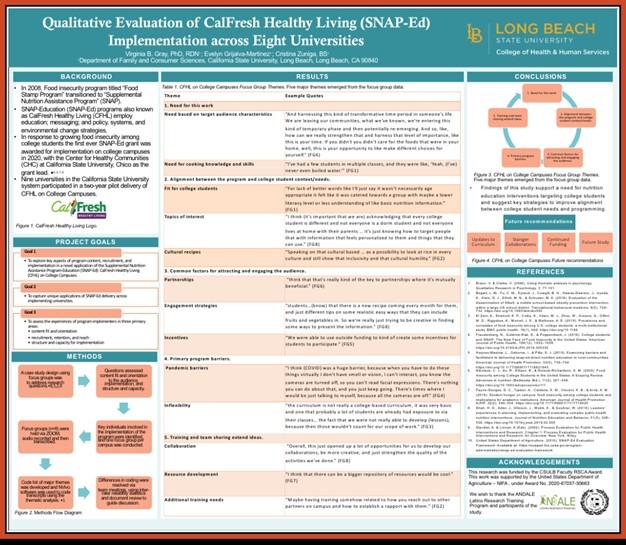CSULB Evaluation of CalFresh Healthy Living on College Campuses
CSU Long Beach has a student population of approximately 37,000, and of those, an estimated
25,308 are SNAP-Ed eligible (qualifying by income). Student food insecurity is estimated to be 37.7 percent.
The novel delivery of SNAP-Ed programming to college students in the California State University system calls for a variety of research and evaluation strategies. While program outcomes are being evaluated by the research and evaluation team at Center for Healthy Communities using the SNAP-Ed evaluation framework, additional research strategies are needed to capture the process of implementation and to suggest future research and programming efforts around SNAP-Ed delivery on college campuses. Collaborating with faculty on implementing campuses is one way to leverage resources to enhance program implementation and evaluation.
Since CalFresh Healthy Living (CFHL) on College Campuses was the first SNAP-Ed program delivered to college students, evaluating fit between existing frameworks for delivery and evaluation and unique needs of college students who experience food insecurity is critical. Dr. Virginia Gray, a faculty member with a background in SNAP-Ed work proposed to lead a process-focused study assessing the experiences of program implementers in three primary areas:
- content fit and orientation;
- recruitment, retention, and reach; and
- structure and capacity for implementation.

The faculty member focused a College of Health and Human Services research grant on this study, and was awarded 6 units of buy out to fund the work. The same faculty member recruited two research assistants funded by the Advanced Nutrition Development through Alliances for Education (ÁNDALE) research training program to aid with data collection and analysis.
“As ÁNDALE research assistants we received training in many aspects of research and professional development. The training prepared and guided me for the work I would be working on with Dr. Gray and CFHL. Working on CFHL helped me visually understand the process of conducting research from waiting for approval from the Institutional Review Board to submitting an abstract and getting it approved to present at FNCE. This experience impacted me as I acknowledged more the importance of research to capture not just quantitative data but also qualitative data that could show the impact that programs for example could have on the community. Without the research on the implementation of CFHL the public may have not known the impact CFHL had on students and implementers, and the areas it needs to be improved in. Overall, I am grateful to have been an ÁNDALE research assistant under the mentorship of Dr. Gray who supported and guided us with her knowledge through this process.”
-Evelyn Grijalva-Martinez
In fall 2021 and spring 2022, the CSULB research team conducted eight focus groups to address research questions developed in alignment with a process evaluation framework. In partnership with staff at the Center for Healthy Communities at CSU Chico, key individuals involved in the implementation of the CFHL on College Campuses program were identified at each participating university2. Participants (n=26) included students, staff, and faculty involved in implementing the grant.
Themes emerging from the focus groups emphasize:
1) need for this work as an extension of basic needs services on college campuses; 2) importance of aligning programming with context/needs of college students; 3) common factors viewed as important attracting and engaging the audience; 4) primary program barriers; and 5) training and team sharing for extending ideas. Findings supported a need for nutrition education interventions targeting college students and suggested key strategies to improve alignment between college student needs and programming, emphasizing topics of interest and building cooking skills. Leveraging funds to support this research extended the scope of project evaluation and contributed to training two future practitioners in
evaluation of community nutrition programs.
Findings of this study support a need for nutrition education interventions targeting college students and suggest key strategies to improve alignment between college student needs and programming.
“During my time as a Research Assistant for the qualitative evaluation of CFHL with Dr. Gray, I was provided with mentorship that guided me through the entire process of this study and beyond. With her encouragement and guidance, I was able to review related literature, co-lead several focus groups, analyze the data collected, and assist in showcasing the study at this year’s Food and Nutrition Conference and Expo. This experience encouraged me to continue my education and pursue a Master of Public Health. I am very appreciative of Dr. Gray and the whole ANDALE team for giving me the opportunity to participate in my first research study.”
-Cristina Zuniga